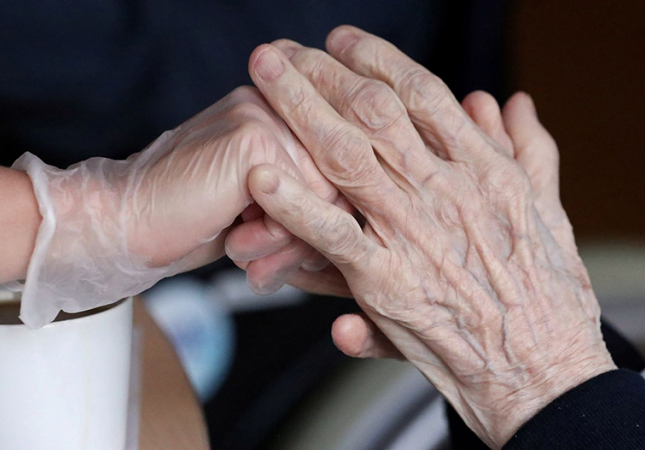
An employee holds the hand of a person at an elderly residence in Brussels April 14, 2020, during the COVID-19 pandemic. (CNS photo/Yves Herman, Reuters)
By: Greg Erlandson
There is a particularly unexpected twist in the saga of many families when the child suddenly starts acting the parent and the parent resembles the child.
It is not a welcome transition, reversing roles and inverting relationships. Sometimes it takes years to really accept it. Before that acceptance comes, there is frustration and anger and nostalgia and sorrow. The hope is that something gentle and generous is what follows.
I went home last month to visit my mom. For most of her life, she has been a mother. She had eight children in 14 years, one of whom died at age 2. She was a wife for 43 years, but her husband, my father, died 26 years ago.
My mom and my dad were great role models for marriage and for adulthood, and we kids kind of idealized them for many years. Of course, as our life experiences grew, we saw more clearly the strains and the sacrifices, the stresses and the resilience that we didn’t notice when we were younger.
My mom was unbowed by my dad’s death, even working weekly on a computer in a Catholic Charities office until she was 92.
But time took its toll. Some incidents suggested disorientation and forgetfulness. Slowly, over the years, the woman who always knew how to put on a feast lost interest in cooking. She learned to mask her memory lapses until she couldn’t anymore.
She needed her kids to go with her to medical appointments so that vital instructions were not forgotten. She began to need in-home care, even with a son and a daughter-in-law living with her.
And slowly the roles reversed. While I live far away from my childhood home, I have wonderful siblings who dote on her and care for her. They help her get dressed and go to the potty. They make sure she is fed and engage her in games.
She can’t go to Mass anymore but watches on TV. One blessing of this time of life is that she doesn’t remember the bad events like losing her driver’s license, even if that means she doesn’t remember the good events either.
It takes a long while to learn how to calm the anxious moments and how to respond to the repetitious questions about where her purse is or where we are going. During that long while is where the pain is. Why doesn’t she remember? Why can’t she keep it straight? Why isn’t she acting like my mom anymore, is what we are really asking.
I was sitting across from my mom during my recent visit, and she was doing a word jumble. She found a word that was upside down and at an angle. The truth is, she found it quicker than I did. And I praised her.
“That was great, Mom. Wow, that was fast!” She smiled, and I felt a sudden pang of sadness that this smart, insightful, loving woman was doing word jumbles and I was praising her as I would my own children when they were little.
But this is where the gentleness and the generosity come in. Now is the phase when the child loves the parent with the selflessness with which he was loved. God has given me an opportunity to just love her without expecting anything more than her smiling back at me and saying, “I love you madly.”
I’m not sure she remembers my name, but she knows this man across the table holding her hand loves her. My only gift I can give is the gift she gave me: The gift of knowing she is loved. Loved madly.